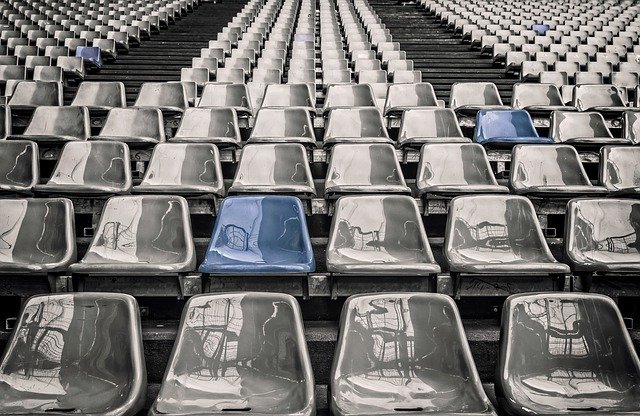Sports Can Heal A Country Even With Empty Seats
BALTIMORE – The first time I took my wife to that oasis of humanity known as the infield on Preakness Day at the Pimlico Race Course, there were half-loaded guys holding up hand-lettered signs reading, “Show Us Your (Bleeps,)” a reference to upper female anatomy that will go unprinted here.
There were other infield spectators who seemed to be sporting more tattoos than teeth. The athletic highlight in the infield had nothing to do with thoroughbred horses. It was a human footrace along the rooftops of a row of spot-a-pots.
“What do you think?” I asked my wife, as she gazed across the big, teeming crowd.
“Does the word ‘inbreeding’ come to mind?” she replied.
And yet, heaven help me, I miss all of it.
They were supposed to stage the 145th running of the Preakness Stakes on Saturday. But, like so much in America during the current plague, there was no horse race, just as we have no baseball and, except for a special program Saturday night broadcast over some TV networks, no high school graduations.
I miss the Preakness because it’s a wonderful, festive day for this city, and it brings in a lot of needed money, and it gives America a glimpse of Baltimore different from the unfortunate picture painted by some corrupt politicians and painful street riots and our appalling number of homicides.
I also miss it because I live about two blocks from Pimlico, and every running of the Preakness brings enormous crowds and a good-natured carnival atmosphere that spills from the track through streets all across the surrounding neighborhoods.
The good news about the Preakness is that it seems to have a future here, if not a present. A few weeks back, the state legislature okayed a deal to keep the venerable race at Pimlico, and spend millions to renovate the place and bring in a bunch of new attractions for all those days when there’s no live racing there.
The not-so-good news is the uncertainty lingering over spectator sports today – and our pleasure in watching them together.
Baseball wants to come back in July – but will we feel comfortable gathering by the thousands in major league ballparks? Or are we looking at ballgames performed in front of TV cameras for millions of us watching strictly, one or two at a time, in our homes?
And what about the players, who move about in cramped, narrow dugouts, hugging and high-fiving each other every time a run scores.
Never mind “safe at home.” Will they be safe in their own dugouts?
Then there’s football. Will we feel comfortable, next autumn, to sit in traditionally packed ballparks? And what about the players, whose lives are endangered by the most basic functions of the game – blocking and tackling, close-up contact, heavy breathing, sweat flying everywhere.
We’re a nation that’s already lost about 90,000 to this coronavirus. We’re also a nation, with 36 million applying for unemployment, that’s hungry to go back not only to work, but to old routines, including our entertainments. Where’s the balance between entertainment and risk?
On Saturday, the New York Times ran a piece headlined “Can Sports Help Heal a Country? Some Fans Don’t Buy the Emotional Pleas.”
The premise is that major league baseball – with so much TV revenue at stake – is making a pitch to come back in July and basing its rationale on emotion and nostalgia for the game.
This is the sport that used to call itself the national pastime and continued playing a full schedule even during the trauma of world wars. The thinking was: the nation needed a sense of normalcy, even in the most abnormal of times.
But they didn’t have a killer virus lurking. The killing was going on far across a couple of oceans.
But we still hunger for a sense of normalcy. It’s not just entertainment that we need right now, it’s a sense that we’re not alone as we sit isolated in our homes, that we do have things in common, including our sense of community and rooting for the same teams (or an occasional winning horse.)
If we’re going to play baseball and football – and horse racing, too – in front of empty stands, it’s a start. But it brings us only marginally closer to that sense of community and belonging for which we hunger. One of our guys hits a homer, we turn to the stranger in the next seat, and suddenly he’s a compatriot. We long for the human touch.
That’s why it was nice to see that special broadcast Saturday night to fill in the emptiness for so many kids leaving high school without an actual graduation ceremony.
It was sweet, it was a heart-tugger, it was a nice piece of Americana – except that, in our ongoing isolation, nobody got to hug an old classmate farewell, or personally thank a treasured old teacher for so much help along the way.

Michael Olesker, columnist for the News American, Baltimore Sun, and Baltimore Examiner has spent a quarter of a century writing about the city he loves.He is the author of several books, including Michael Olesker’s Baltimore: If You Live Here, You’re Home, Journeys to the Heart of Baltimore, and The Colts’ Baltimore: A City and Its Love Affair in the 1950s, all published by Johns Hopkins Press.

